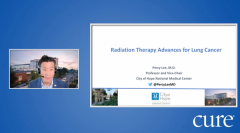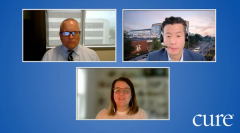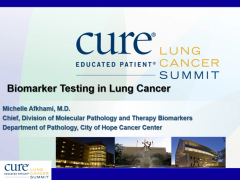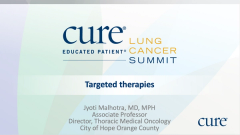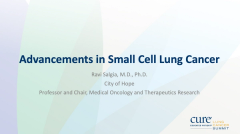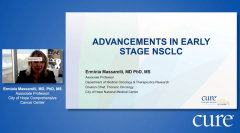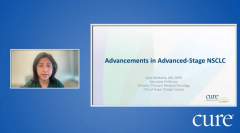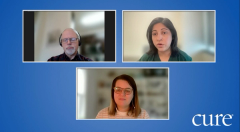
Educated Patient® Lung Cancer Summit Targeted Treatment Panel: April 29, 2023
Watch Dr. Ed Kim, Dr. Jyoti Malhotra and Terri Conneran answer questions about targeted therapy during the CURE® Educated Patient® Lung Cancer Summit.
Episodes in this series

This panel was moderated by Dr. Ed Kim, and included Dr. Jyoti Malhotra and Terri Conneran, from KRAS Kickers.
Kim: Terry, you have been more than a witness to all this, you have a deep personal involvement. So maybe a little bit about yourself and then what your impressions have been about what you've seen with lung cancer.
Conneran: So I'm So I'm Terry Conran, and I'm a six-year lung cancer survivor. But I use the term survivor kind of generously because it's not like you survived it, and it's over like it was a hurricane, that's more of an ongoing battle. The super short version of my journey is it took three years a second diagnosis for me to find out that I had a biomarker that was on my cancer, that was driving my cancer. It's KRAS, but it was on the original report, and I wasn't getting the information. And finding out that information not only kind of gave me a sense of identity as far as what the name of this devil is that my body is fighting, but it also gives me the information as a patient so I can best advocate for myself, and know what it is, the treatments that I could be asking about.
So become an intelligent, empowered patient. That kind of journey landed me into starting a patient empowerment group called KRAS Kickers. So it's when you found out what this was what this means. And then subsequently, it just happens to be the beneficial timing because we now have two approved treatments for a subtype.
Kim: Yeah, that's very exciting. And Terri has really been a very powerful advocate in the area, not waiting to just to get more drugs, more technology, etc. So, Dr. Malhotra, where is the next promise coming from? Where do we struggle? And where are we? Where do we need to go?
Malhotra: So I think a lot of research is ongoing. If you look at it, there are hundreds of trials ongoing right now targeting each of the different targets that we mentioned in the talks today. And some of them will work and some of them won't, but the whole point is to continue and try to explore novel therapies. There are certain targets, which we still haven't found treatments for. For example, as Terri mentioned, the KRAS subtypes other than G12C, we still do not have treatments for those. Some of the other targets, for example, I talked about EGFR (subtype) mutations, but the treatments are not as effective, for example, for the common EGFR mutations. So there's still a lot of work to be done. And I think what's needed is for everyone to work together, the patients who agree to go on trials, the physicians and the researchers who present these trials and continue onwards with all the research that's going on.
Kim: All right, well, there are a bunch of questions here. The patient presents with a solitary brain met and undergoes brain surgery in the first place. Afterwards, the results of the molecular tests show a driver mutation. We all know that TKIs are effective in the brain. Do you suggest radiotherapy boost to the tumor bed after the brain surgery in case if the driver mutations form or is it unnecessary? What do you what are your thoughts there? I think the concept is that we have TKIs that now are able to penetrate into the brain.
Malhotra: so there are two facts that we need to look at. One is that when we save TKI, not every TKI has the same benefit for brain metastases, some of the TKI such as Alecensa (alectinib) or Tagrisso (osimertinib) are very effective, but some are not so much. So it really depends on what target it is and what treatment we are talking about.
The second point is that usually, when we let TKIs treat existing brain metastases, it's usually when these are smaller in the brain and not causing symptoms. If a patient had surgery for the brain (metastases), I'm guessing that was because it was a certain size that it was resected and for larger brain (metastases) the recommendations are still to treat with surgery followed by radiation to the surgery band, and after that the TKI to prevent any residual microscopic disease from getting worse.
Kim: I think it's really a great that some of the newer generation drugs, third, fourth generation drugs have less side effects. Now not no side effects but different side effects, less side effects, and more potency. And that's nice, because a lot of times when you associate more potency, it brings additional side effects around it. But we really have seen that and especially penetration into through the blood-brain barrier to affect even treatment of whether we go for brain metastases that may be small and really can be first tried with an oral therapy.
Terri, what are your thoughts around that? I'm sure you hear a lot of comments about that.
Conneran: Oh, yeah, well, we don't have any TKIs for KRAS cancers. And, you know, the G12C patients, they only have an approved drug for second-line therapy. And so it's a little tenuous for the rest of us, myself, and a large portion of the lung cancer patients who don't have G12C, and they may or may not have a smoking history. So we're seeing an awful lot of patients that get excluded from clinical trials, because they have a brain met. And it's very frustrating for us. As you know, it's more of a call to action, and something that I know that everybody's struggling with, because nobody wants to have anything in the brain to begin with. But it is necessary for us to be able to have different considerations as far as it goes. And so there's a lot of hope for the future as it pertains to the brain mets, but I wish we could all do better.
Kim: One of the questions that came through is, what if you find a mutation, and then it disappears? Is it that it's gone, did it change locations? What do we do in that type of situation?
Malhotra: So one thing to remember here is that when we do testing to try to identify any mutation, it's not 100% sensitive or specific, which means there is a small chance that it may miss something. So when you do testing, and you find that the mutation has disappeared, it could be because either they didn't have enough tumor cells, or if it was done on a blood-based test, sometimes the tumor evolves, and the cells that are being shared are a little bit different from what the tumor was initially. So there, it can be from a number of different reasons, one, based on the technology that was used, and the test that was done, it can still miss. Secondly, a tumor was right, a tumor evolves, it tries to learn how to become resistant to current treatment. And that's why we see new resistant mutations many times when we do repeat testing.
Kim: Yeah, that's just the fight that goes on between the tumor and your body, right, and the immune system trying to do that. One question that came up is, how frequently should we recheck for biomarkers? Someone who's got stable disease or maybe is in remission, how often do you like to do that with liquid biopsies per se, when there's minimal residual or no disease?
Malhotra: So right now, definitely a diagnosis. And when the tumor starts getting worse, or stops responding to current treatment, in terms of using liquid biopsy to monitor disease status, we still don't know everything about it, right? We're still learning. A lot of research is ongoing. And even if we do liquid biopsy, while the disease is stable, we don't know what to do with those results. And we don't want to really influence our treatment decisions based on something that we're still learning about. So I would say that probably we'll know more and have more data in the coming few years. But for meanwhile, the recommendations are really to use liquid biopsy when we really feel that there is a clinical need to change treatment.
Kim: Terri, what are you hearing from the patient side around things like that, and about the drugs that are being studied, especially in the KRAS side, there are multiple subtypes other than just G12C.
Conneran: It all begins with that whole biomarker test. And you don't know what it is that you're dealing with, as a patient as a doctor, and whatever it takes to get that that initial test seems to be making the biggest difference. One of the things that I see happening than it used to be that it was presumptive, if you have any sort of a smoking history, of doctors, there's no need to do a biomarker test. Well, now we're kind of proving that absolutely wrong because if you have a G12C biomarker, you typically have some sort of a smoking history. Well, that group, that portion of people, is equal to at least the EGFR population in lung cancer. And so it's really underscoring the initial importance of it. And as the inhibitors are coming online, whether it's through a clinical trial, or it's already an approved drug, or even just from an existing standard-of-care treatment, we are watching and seeing mutations change.
We have seen people come in to join the group that started out with an EGFR mutation, biomarkers that have changed into a KRAS or they've acquired a secondary one. And so now, it's not just a problem of one, but it's become a different problem. And until you get the full diagnostics right, retesting is super important. I think that across the board, and I know this isn't a City of Hope issue but this is an international issue is that that biomarker testing is just not happening for the people that it needs to happen for. And I don't know how I can make a difference as far as that is concerned, because it's a matter of screaming from the rooftops, that it doesn't matter if they're smoking or not. Smoking history doesn't matter. If you know your ethnicity, it matters that you need to do the testing. And a doctor should not be driving blindfolded when it comes to diagnostics, and it comes to treatments.
And so I applaud you guys and all that you're doing. But hopefully people outside of this particular network hear this and see this, and they recognize the level of importance as far as knowing what that is, and asking for the full information. So they're not just as a patient going out looking for lung cancer treatments, they have enough clarity, that is squamous, it's KRAS, is EGFR, is KRAS G12C or G20, or something. So that's something everybody needs to do better on. But we definitely need to get more clarity and breaking it down more as far as what the treatment options are.
Kim: That's great. Dr. Malhotra, not exactly your area of expertise, but it was a question that came up. Do we have any targets for BRCA1 gene, it's a common one.
Malhotra: So we don't have a target which engages BRCA1 directly. So we don't have a direct, engaging target. But there are a certain group of drugs which have been found, which work well with BRCA1-mutated cancer. So BRCA1 gene basically impacts the ability of the tumor cells to repair themselves. So any drug which kind of targets the DNA repair process can work well for those tumors. For example, PARP inhibitors are a class of drugs, which have proven to be quite effective for patients who have BRCA1 mutation, and it's actually even approved for patients with breast cancer and ovarian cancer. And I believe it works well for patients even with lung cancer, if they have BRCA1.
Kim: Yeah, there's one of those where we're continuing to try to find something. It's still a little bit behind where we are. A lot of these targets, we use combinations of chemotherapy and some sort of mixed biologics. And we feel a lot better when we find a therapy that absolutely targets the singular aspect of that biomarker. And we see that's the most effective. Switching over to immunotherapy, obviously, that and we'll talk about this as well later. Engaging your own body's immune system has really changed the game as well. And luckily, we found ways to allow your body's immune system to attack these tumors, identify them, recognize them because they were cloaked before. But now we're seeing that, so lots of different things happening. I think there's a lot of excitement on the forefront. I'll just go and say, any last comments from each of you, starting with Terri then Dr. Malhotra?
Conneran: It's super important for people to recognize, that's a patient, right? You need to be calm, empowered and knowledgeable about what it is that you're fighting. And even if you don't care yourself as the patient right, your people around you do and getting access to the information is really, even though it may not solve the problem, is going to get you an opportunity to have better control of the knowledge and you know, a sense of competence. that you're doing the right thing. I think that's very important to have that sense of clarity. And so you can move forward with it. And you know, when it comes to biomarker testing, comes to targeted therapy, that's part of recognizing that each one of us is a person in that personalized medicine and recognizing the importance of that DNA testing. And the biomarker testing, you know, to get a comprehensive result, get your reports, ask for the reports, know what you're dealing with.
Malhotra: I completely agree with that, that patients and their families really have to be advocates for themselves. To seek, first of all, a full panel of biomarker testing, the whole panel, the whole works. And the second thing is turnaround time. So even if you do testing, if it's going to take three months for the results to come back, that doesn't help. So then you advocate for getting a full panel of cast, also advocate for that to happen sooner rather than later. So that the results are in your hand early and they can be acted on.
Kim: Yeah, I'll just finish by saying, you have an acknowledgement slide here. There's a lot of teams on here, and really how the makeup of teams and it does take a team to move anything in science. And you know, that's what science, advocacy, policy, payers, all these different aspects that have to come together to make anything successful. We really have and we're seeing this, which is great, we're seeing more and more of our patient advocates being involved in earlier steps. It used to be that it was just serving on IRBs than it was after the studies were designed. Now we're seeing inclusion of our people earlier in the process, even in the pre-protocol planning phase. And I think it's really important in every other business, it's about know your customer, know who your target audience is. The fact that, in science and research, we're designing these studies to target a disease. I think we have to fix that nomenclature where we're trying to help patients. And so we have to have them engaged early on to do this.
And one of the areas I've been really passionate about is inclusion, inclusion criteria, eligibility criteria, and you read these protocols, they look like your tax documents, they're hundreds of pages long, and they're a lot of unnecessary exclusion factors. And it just bugs me and we've made a lot of strides to change that. It should be very simple to get somebody on to a clinical trial. But for some reason, it has become extremely complex. And there are multiple reasons why this happens. We always talk about safety first, but you know, the risk-benefit ratio changes if you're the one who's facing cancer, or if it's your loved one. So we have to always be very cognizant of including the patient's viewpoints on this.
Transcription edited for clarity.
For more news on cancer updates, research and education, don’t forget to

